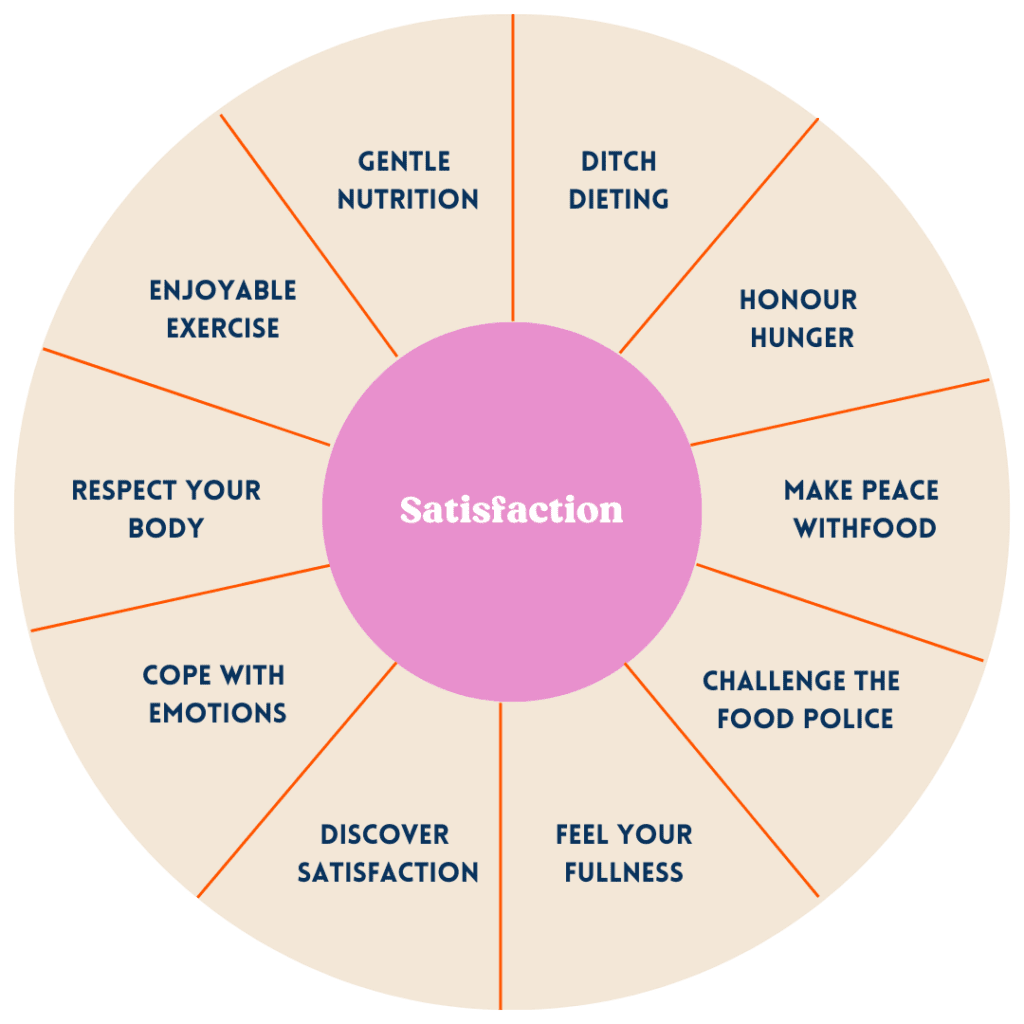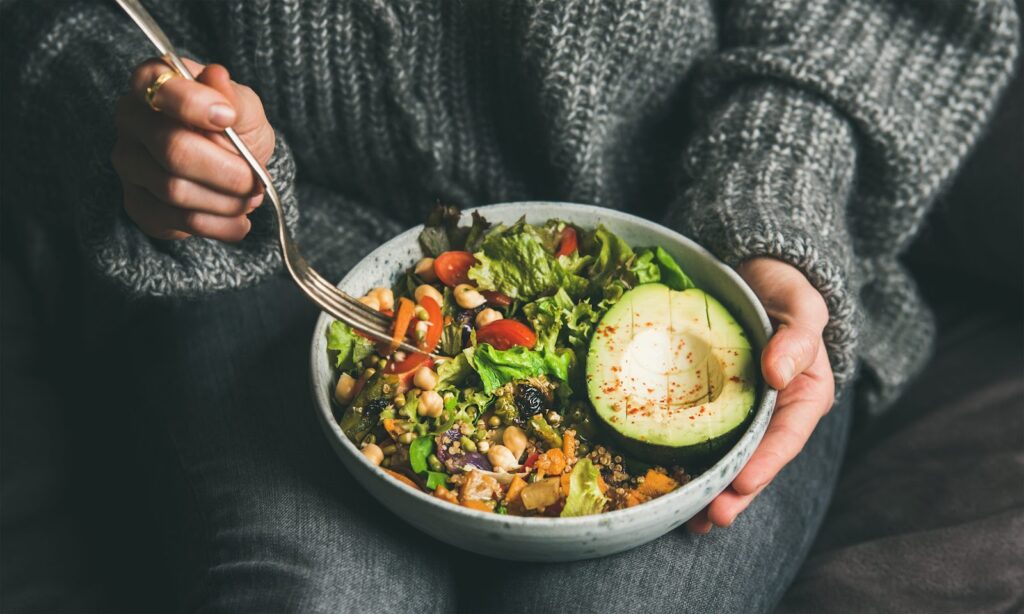It’s unlikely that you remember your eating habits as a baby or small child; however, if you were to ask your mum or dad, they would most likely tell you that you cried when you were hungry and stopped eating when you were full.
You see, we’re born with the innate ability to know when we’re hungry and full (a fundamental principle of intuitive eating). However, with the constant inundation of diet culture, food marketing, societal pressures and environmental triggers, we lose our ability to tune into our intuition over time. But we can reclaim it with intuitive eating.
Who created Intuitive Eating?
Evelyn Tribole & Elyse Resch have championed intuitive eating for over 25 years. Since then, it’s become an integral component of the non-diet approach and is far from a diet. Designed to liberate people from inter-generational dieting behaviours, reduce all-or-nothing thinking and drown out diet culture messaging, intuitive eating empowers individuals to regain control of their health and repair their relationship with food and their bodies. It does this using ten core principles, helping us reconnect with our body’s internal cues, honour our health and ultimately obsess less about food so we can live more.
What are the 10 Principles Of Intuitive Eating?


1. Reject The Diet Mentality
Diets don’t work. It’s time to shift the mindset around dieting and become aware of the books, youtube channels or influencers promising quick weight loss strategies. You already have the skills and knowledge within you to live a healthier and happier life; you need the right tools to access them. To relearn intuitive eating transition from diet culture and the idea that there’s some quick fix out there.
2. Honour Your Hunger
Giving yourself permission to feel hungry and nourish your body with enough energy to meet your body’s biological needs is an essential step in reducing overeating. “Learning to honour this first biological signal sets the stage for rebuilding trust in yourself and food.” – Evelyn Tribole & Elyse Resch
3. Make Peace With Food
Readjust the way you label foods. Labelling food as ‘good vs bad’ can lead to intense feelings of guilt, resulting in unhealthy eating behaviours, such as bingeing or deprivation. Simply changing the way we label foods, such as ‘healthy vs less healthy’, can help remove the guilt associated with food and navigate the pathway to a more peaceful relationship with food.
4. Challenge The Food Police
We all have internal food police monitoring our every bite from the deep recesses of our brain. The police were not innate; they were developed as children and became more powerful as we grew into adults. You will hear them labelling “bad” when you pick up that piece of cake and “good” when you reach for the fruit.
5. Discover The Satisfaction Factor
Food has evolved from a means of energy and survival. It is an integral part of social interactions, religion and celebrations, is it designed to be enjoyed and satisfy our evolved and complex human needs. Diet culture has stripped the pleasure and satisfaction from eating. Working through the above principles and relearning how to eat intuitively will help you find the satisfaction food provides again.
6. Feel Your Fullness
Once you have worked through the above principles, you will be able to move towards eating the food you desire, listen to internal body cues and stop eating when you’re no longer hungry. Using strategies initially like pausing during meals, chewing your food correctly, asking yourself how the food tastes and asking yourself, am I full?
7. Cope With Your Emotions With Kindness
Emotional eating is widespread. Anxiety, boredom, depression, anger are just a handful of emotions that can trigger the instinct to eat. Even restrictive food behaviours can trigger a loss of control, eliciting a sense of emotional eating. The above emotions are unavoidable in life, and contrary to common beliefs, eating won’t remove these emotions. Eating is a defensive mechanism, not a coping mechanism. Finding coping strategies that work for you that don’t involve food and provide comfort can help you find and deal with the source of the emotion.
8. Respect Your Body
A body can be healthy no matter what your size. It’s time to accept your genetic body composition.
“It’s hard to reject the diet mentality if you are unrealistic and overly critical of your body size or shape.” – Evelyn Tribole & Elyse Resch
9. Movement—Feel The Difference
Quite often, the barrier to increasing movement is overpromising yourself and underdelivering, setting unrealistic goals. You don’t have to run a marathon or attend a daily Bootcamp, and even short moderate exercise can make you feel better. Shifting the focus away from energy exertion and how exercise makes your body and mind feel is the real goal. You’re much more likely to get out of bed and go for a walk if you enjoy what you’re doing, so find the movement you enjoy.
10. Honour Your Health—Gentle Nutrition
Of course, it’s essential to nourish your body with food; however, it’s also important to enjoy the food you eat. You don’t have to eat ‘perfectly’ every day to be healthy. It’s beneficial to include a range of foods. Consistency is the key. If you are eating more nutritious foods most of the time, then eating a portion of less healthy food from time to time will not make you unhealthy.
What are the benefits of Intuitive Eating?
While intuitive eating focuses on honouring your hunger and rejecting the diet mentality, it has other benefits. From helping you find food freedom, build a healthy relationship with food, and reduce disordered eating and eating disorder risk to increased self-compassion and reduced feelings of stress and anxiety, it’s an incredibly helpful framework for helping people break free from dieting and emotional eating.
Does Intuitive Eating Lead To Weight Loss?
The goal of intuitive eating is not weight loss. As you become an intuitive eater you might notice your weight decreases, increases or stays the same. If you’re interested in becoming an intuitive eater, it’s important to put your weight loss desires on the back burner, so to speak. Focusing on external factors such as weight can make it hard to listen inwards to our body’s signals – the goal of intuitive eating.


Learn more about intuitive eating
This topic has been studied and discussed for many years, and hopefully, the message will continue to be spread. If you’re keen to learn more about intuitive eating, we recommend checking the following websites and publications.
Resources
- https://www.intuitiveeating.org/10-principles-of-intuitive-eating/
- https://alissarumsey.com/
- Intuitive eating, objective weight status and physical indicators of health – N. G. Keirns, M. A. W. Hawkins First published: 11 July 2019


Erin’s an Accredited Practising Dietitian & Certified Intuitive Eating Counsellor. She uses a non-diet approach and weight-inclusive care to help her clients reclaim a healthy relationship with food and their bodies free of guilt, shame and restriction.












View comments
+ Leave a comment